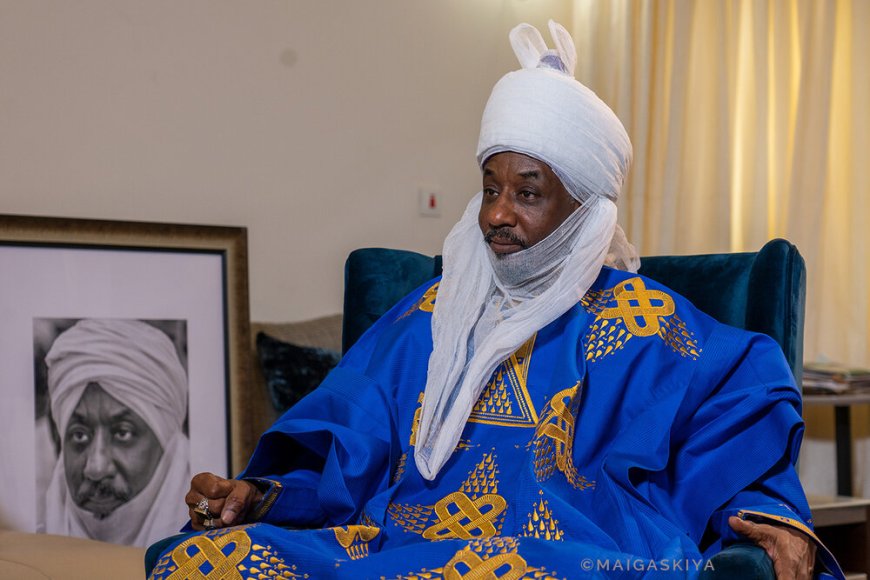Emir Sanusi Cautions Tinubu: Continuous Borrowing After Subsidy Removal Is Wrong

The 16th Emir of Kano and former Central Bank of Nigeria (CBN) Governor, Muhammadu Sanusi II, has faulted President Bola Tinubu’s administration for resorting to massive borrowing despite the removal of petrol subsidy, a policy that was expected to boost government revenue.
Speaking in Abuja on Tuesday at the Oxford Global Think Tank Leadership Conference and Book Launch, Sanusi questioned the logic behind continuous borrowings when, according to him, “the government should have more fiscal space” after ending the costly fuel subsidy regime.
While commending the Tinubu administration for removing fuel subsidy and unifying Nigeria’s multiple exchange rates, measures he described as “painful but necessary”, the outspoken emir wondered why the fiscal discipline expected from such reforms has yet to reflect in national spending priorities.
He, however, cautioned that the reforms would fail unless matched with fiscal discipline and transparent spending.
“If you stop paying subsidies but continue borrowing more, it means you’ve filled one hole only to dig another. The real challenge now is the quality of government spending and the management of the revenues saved,” he said.
Sanusi, who served as CBN governor between 2009 and 2014, said Nigeria’s current economic woes were the consequence of years of policy inconsistency and populist politics.
“In 2012, we warned that the subsidy was unsustainable, but politics took over. Now, the same people who led protests against it have inherited the problem and had no choice but to do the right thing,” he said.
He applauded the professionalism of the current economic team for the steps taken to stabilise inflation and reduce exchange rate volatility, but insisted that government waste must be urgently curtailed.
Questioning the government expenditure, he asked: “Why do we need 48 ministers? Why do we need convoys of vehicles? Why are we still borrowing even after removing subsidies? If you fill one hole, why dig another?
“This government needs to look at institutions, transparency and how money is being used at all levels. Because if you keep earning more and spending badly, you’ll undo every gain made.
“We have too many sycophants in government. You sit in a meeting, and someone begins with, ‘Mr. President, I thank you for your leadership; God has blessed Nigeria by making you our leader.’ By the time they finish the praise-singing that is the advice the president takes.
“However, people like me that will say ‘Mr. President, this is wrong’ are branded enemies. So, when leaders surround themselves with praise-singers, they never get good advice.
“That is why people like Aigboje Aig-Imoukhuede and myself often end up being enemies of the state because people don’t like hearing bad news.
“We told Buhari everything — about printing money, waste, exchange rates, and subsidy— but each time, it was seen as a personal attack. Those around him convinced him we were enemies. Leaders must begin to ask: who do I surround myself with?
“And ministers should know — it’s not to your benefit to become a praise-singer. You debase yourself when you do that.”
Speaking on why the Jonathan government could not remove the fuel subsidy, Sanusi said: “The only reason the government compromised then was Boko Haram. There were thousands of Nigerians on the streets in Lagos, Kano, Kaduna and there were suicide bombers in the country. I told them, if one of these bombers explodes among protesters, we’d have 200 corpses; it won’t be about subsidy anymore.
“So, I must give President Jonathan credit. He was determined to do it, but at the end of the day, the compromise was made to save lives.”
Sanusi said that in 2012, “We were in a situation where we had what we called a hedge — not a subsidy. You see, a subsidy means the government pays a percentage of the price. But what we had was what, in risk management, you call a naked hedge, the worst possible derivative you can have. You will not pay more than X amount per litre of petrol, no matter what happens.
“So when oil prices rose from $40 to $140, the federal government paid the difference. When exchange rates moved from N155 to N300, the government paid the difference. When interest rates moved from 5 per cent to 15 per cent, the government paid the difference.
“All those costs — crude, refining, transportation, interest — were absorbed by the government. We moved from using revenues to pay subsidies, to borrowing money to pay subsidies, to borrowing money to pay interest on the borrowed money. We became bankrupt."









